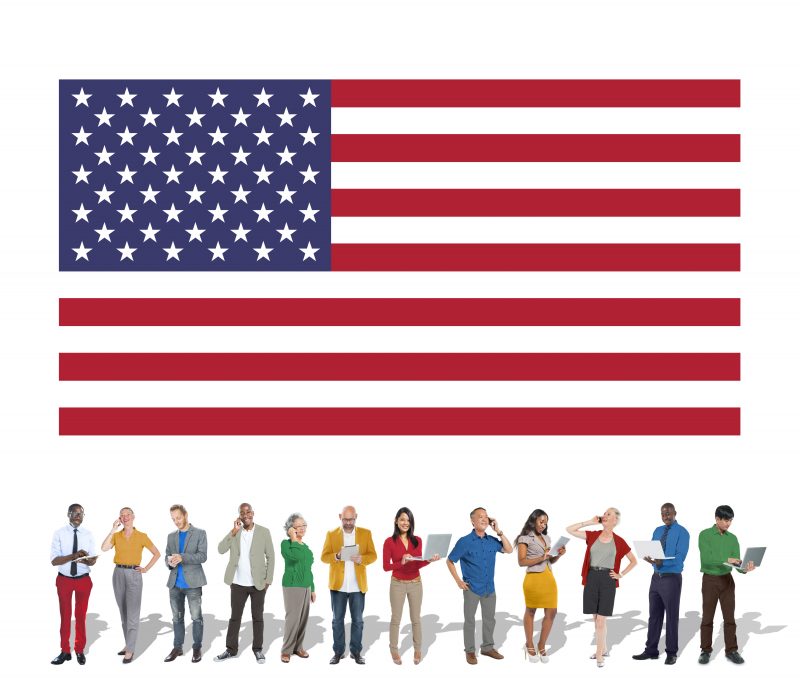If we are genuinely interested in having an intelligent conversation about race and President Trump, we first need to suspend the daily spleen-venting that has infected our discourse. As in every area of our polarized politics, the discussion about race is dominated by people who have very different perspectives of the world. Therefore, to make progress, we must understand the fundamental viewpoint of each side, not just the self-interested characterizations and frequent outrage. Otherwise, we will continue with this disconnected set of monologues as a poor substitute for an actual dialogue.
One side views America as the ultimate experiment in cultural pluralism with a wide diversity of people and ideas that come together in a beautiful mosaic. To them, diversity is a strength, not a weakness, the more, the better. The other side views America as a predominately European, Judeo-Christian nation founded in the traditions of European Christian men such as John Locke, Isaac Newton, and the Founding Fathers. They believe that anything that challenges these cultural conditions undermines the pillars upon which our enormous success was founded.
Complicating matters, President Trump has defined our political process as ‘us vs. them’ in which race becomes just another flashpoint in the battle over identity politics and partisan tribalism. Unfortunately, the Anti-Trump forces have been more than willing to take the bait and embrace the ‘us vs. them’ warfare as the prevailing dynamic in our political process. This clearly drives emotions and fundraising but does nothing to solve the problem.
For Trump and many of his supporters, the “us” is the traditional European, Judeo-Christian elements within our nation. Trump won the white vote by 21 percentage points in 2016 and is looking to increase that margin in 2020. Within that segment of society, there is intense anxiety over the demographic changes currently taking place. In a recent Pew survey, 46% of white Americans view the transition from majority white to a majority-of-minorities country as a shift that “would weaken American customs and values.”
They view anything that alters or changes this cultural status quo as an existential threat to their way of life and the nation as a whole.
Is Demographics Destiny?
One of the most compelling challenges to this worldview is the demographic changes that are altering the composition of the US population.
This is not an abstract issue; it is already happening. Today, white children in public schools are already below 50 percent of the total student population. Further, at some point in the next twelve months, the entire under-18 population will be majority non-white, and in ten years, the under-30 population will be as well. According to recent government census projections, in 2045, whites will comprise 49.7 percent of the US population, making the US a majority-minority country.
These trends are playing out on another front as well. The foreign-born population living in the US has gone from a low of 4.7 percent in 1970 to 13.6 percent of total residents. Today, 44 million people born in another country, live and work in the US. This percentage is higher than at any time since 1910 when we were still experiencing an influx of European immigration. No matter what side of the issue your sympathies fall on, this represents a significant shift in our society and requires a level of leadership that is sorely lacking in our two dominant parties.
Our future is immensely bright, but it won’t look exactly like our past
To bridge the divide, the critical question we should be asking is, what is the overall effect of this influx of immigration and foreign-born people on the well-being of our country. Of the current Fortune 500 companies in America, 45 percent have either a first- or second-generation immigrant among their founders. Last year, these companies produced 6.1 trillion dollars in revenue (which is larger than the GDP of Japan) and employ more than 13.5 million workers. Since 2000, 33 of the 85 Nobel Prizes won by Americans in Chemistry, Medicine and Physics have been awarded to immigrants. That’s 39 percent of the total US Nobel Prizes in the vital STEM fields that are so essential to our future success.
Putting all of this in perspective, let us consider the analysis of an objective observer of global trends. Several years ago, Lew Kuan Yew, the founding father of Singapore, in discussing the positioning of the US in global competitiveness, stated that China had a comparative advantage with over 1.3 billion citizens from which to draw talent. However, the US had an even more significant advantage in being able to draw on a talent pool of over 7 billion people. Additionally, America’s competitiveness was superior due to our demonstrated capability of applying creativity and flexibility in a way that China could not.
The conclusion should be obvious; our melting pot is cooking up a stew of success. The composition of that pot is very different than 100 years ago, but the results are the same. We benefit mightily from our strategic openness and creative combination of people and resources. At the same time, these massive cultural shifts need to be handled with care, nuance, and thoughtful leadership. Something our current political process is entirely unable to produce. The non-stop tribal warfare from both sides exacerbates the problem, inflames the tensions, and leads to more hatred, more distrust, and lower quality governance and life for everyone.
Grievance politics only generates greater grief
If you believe that the US will continue to achieve success at the same rate, we have in the past by using the same formula we have in the past, and the objective facts do not support your views. Moreover, the demographic changes are rapidly narrowing the application of your argument. We must deal with reality, which means finding ways to reconcile our Euro-centric traditions with a wider, more diverse world. On the other hand, if you completely ignore and devalue the destabilizing effects of a significantly shifting ethnic and cultural landscape because it benefits your political power and agenda, then you are also disregarding reality and contributing to the dearth of leadership and solutions.
To bridge the divide and solve the problem, we need to fully appreciate and embrace both the rich cultural tradition we have inherited and the new realities of a 21st-century society with global competition and intensifying pressure to develop new ideas and new products continuously. Erecting barriers to everyone except white Christians of European descent will not work and neither will labeling everyone who disagrees with you a racist or an interloper.
Looking to the future, not the past
In the early 19th century, many workers in the UK were facing a similar fundamental shift in their society. The automation of the Industrial Revolution was disrupting most industries. Even though this process elevated whole segments of the British population from back-breaking subsistence agriculture and low-wage cottage industries into the poverty-obliterating middle class, the transition was fraught with violence, resistance to the inevitable forces of change and slow adaptation to new, improved ways of doing things. When faced with the forces of creative destruction, it is far more beneficial to focus on the creation, not the destruction.
To bridge this gap, we must break the fever of ‘us vs. them’ identity politics on both sides and accept the reality of change within our society. By beginning the conversation with a discussion about how we can most effectively adjust to the new demographic realities, treating all sides fairly and recognizing the concerns of everyone, then we can begin to focus our discourse on solutions. Otherwise, we will be stuck in this endless cycle of perpetual partisan pugilism. As we have witnessed throughout history, grievance politics ends up generating greater grief because it promises a return to a bygone utopian era that is no longer possible.
By looking to the future and focusing on maximizing our prosperity based on the reality of our ethnic and cultural makeup and attracting and developing the best talent in the world, we will continue to advance far into the 21st and 22nd centuries.



